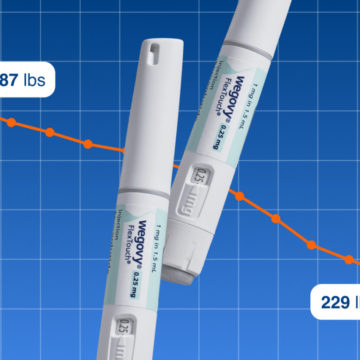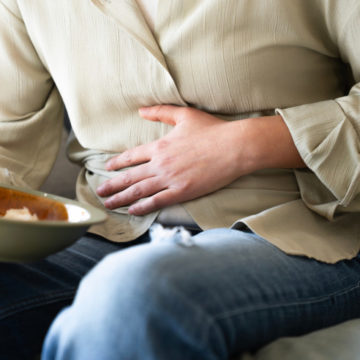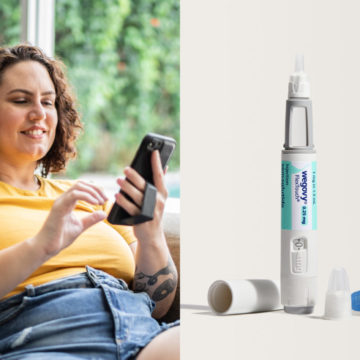Semaglutide isn’t a miracle drug for weight loss. It should be combined with a balanced diet and increased physical activity to help you reach your weight loss goals. These are our expert dietary recommendations to maximise your results and reduce side effects.
What is semaglutide?
Semaglutide is an active ingredient that’s used in some GLP-1 receptor agonist drugs. This group of medications mimic the action of a natural hormone in your gut, glucagon-like peptide-1, to reduce your appetite, regulate your blood sugar levels and make you feel full for longer. [1]
Should you follow a diet plan on semaglutide?
For best results, semaglutide treatment should be combined with a reduced calorie diet. Instead of following a set meal plan, we recommend following general healthy diet tips to make your lifestyle changes feel manageable and sustainable. Our key guidance includes: practising portion control, increasing your protein and fibre intake and reducing consumption of ultra-processed foods. You should prioritise flexibility, rather than restriction, so you can create healthy habits that fit your lifestyle and food preferences.
Portion control
Because semaglutide helps slow gastric emptying, or the rate your stomach empties after eating, many people find it naturally encourages smaller portion sizes. [2] Here are some more tips to help you stay consistent with portion control:
- Use smaller plates and bowls to limit portion sizes, and try to avoid large, unportioned packets. You can always eat more if you’re still hungry.
- Measure your food using measuring cups, scales or other visual cues to make sure you’re getting the right serving sizes for each food group.
- Listen to your hunger and fullness cues so you stop eating when you’re satisfied.
- Prepare meals and snacks in advance. Not only is this convenient, but it means you can use containers or food bags to manage quantities.
Eat plenty of protein
It’s vital you eat enough protein on your weight loss journey to prevent lean muscle loss. Protein also creates a feeling of fullness, boosting the effects of your medication. [3] Focus on lean proteins, which are low in fat. These include:
- Poultry and fish
- Greek yoghurt, low-fat cottage cheese and eggs
- Plant proteins, like tofu, leafy greens, beans and legumes
Try to include one lean protein source in every meal.
Increase fibre intake
We also recommend increasing your fibre intake while taking semaglutide. Dietary fibre not only supports digestion, but it helps control your blood sugar levels. [4] Some examples of high-fibre foods are:
- Fruits and vegetables
- Whole grains
- Legumes
Stay hydrated
It’s important you drink plenty of water when you’re taking semaglutide to help you manage gastrointestinal side effects, like nausea, diarrhoea and constipation. You should aim to drink 6-8 glasses of fluid per day.
Foods to avoid on semaglutide
Although you should avoid restriction, you should also be mindful of reducing your intake of certain foods:
- Processed foods: This includes processed meats, fast foods and pre-packaged meals or snacks. These are often high-fat foods with lots of artificial ingredients, so they provide very little nutritional value. Opt for whole, nutrient-dense foods instead.
- Refined carbohydrates: Foods like white bread, white rice and refined pasta contain less fibre and essential nutrients than wholegrain options. This can lead to blood sugar spikes and leave you feeling unsatisfied after eating. Try whole grains like quinoa, brown rice and oats.
- Added sugars: Sugary foods and drinks can contribute to weight gain and other health issues. You can enjoy them in moderation, but try to limit sugary drinks and check food labels for hidden sugars in things like sauces, salad dressings and snacks.
- Unhealthy fats: Avoid trans fats found in fried foods and limit saturated fats, found in fatty meats, full-fat dairy and butter. Examples of healthy fats include avocados, nuts and olive oil.
Can I drink alcohol while taking semaglutide?
Alcohol can cause you to become dehydrated, it can also cause overeating [6] and fluctuations in your blood sugar levels. [7] Many alcoholic drinks are high in calories, too, which could slow your progress.
So, we recommend limiting your alcohol intake while taking semaglutide. If you do drink, do it in moderation and try to avoid juices, sugary mixers and syrups. The NHS recommends that men and women shouldn’t drink more than 14 units of alcohol per week on a regular basis. [8] You can find out more about alcoholic units here.
Ready to start your weight loss journey?
If you’re interested in a plan for weight loss that lasts, MedExpress can help find the weight loss medication for you.
Find out what treatment is suitable for you on MedExpress.
References:
- Blundell J, Finlayson G, Axelsen M, Flint A, Gibbons C, Kvist T, et al. Effects of once‐weekly semaglutide on appetite, energy intake, control of eating, food preference and body weight in subjects with obesity. Diabetes, Obesity and Metabolism [Internet]. 2017 May 5;19(9):1242–51. Available from: https://www.ncbi.nlm.nih.gov/pmc/articles/PMC5573908/
- Silveira SQ, da Silva LM, de Campos Vieira Abib A, de Moura DTH, de Moura EGH, Santos LB, et al. Relationship between perioperative semaglutide use and residual gastric content: A retrospective analysis of patients undergoing elective upper endoscopy. Journal of Clinical Anesthesia [Internet]. 2023 Aug 1 [cited 2023 Mar 3];87:111091. Available from: https://www.sciencedirect.com/science/article/abs/pii/S0952818023000417?dgcid=coauthor
- Halton TL, Hu FB. The Effects of High Protein Diets on Thermogenesis, Satiety and Weight Loss: A Critical Review. Journal of the American College of Nutrition. 2004 Oct;23(5):373–85.
- Reynolds AN, Akerman AP, Mann J. Dietary fibre and whole grains in diabetes management: Systematic review and meta-analyses. Ma RCW, editor. PLOS Medicine [Internet]. 2020 Mar 6;17(3):e1003053. Available from: https://www.ncbi.nlm.nih.gov/pmc/articles/PMC7059907/
- Roberts KE. Mechanism of Dehydration Following Alcohol Ingestion. Archives of Internal Medicine [Internet]. 1963 Aug 1;112(2):154–7. Available from: https://jamanetwork.com/journals/jamainternalmedicine/article-abstract/568848
- Traversy G, Chaput JP. Alcohol Consumption and Obesity: An Update. Current Obesity Reports. 2018 Jan 8;4(1):122–30.
- Emanuele NV, Swade TF, Emanuele MA. Consequences of alcohol use in diabetics. Alcohol health and research world [Internet]. 1998;22(3):211–9. Available from: https://www.ncbi.nlm.nih.gov/pmc/articles/PMC6761899/
- National Health Service. The risks of drinking too much [Internet]. nhs.uk. 2022. Available from: https://www.nhs.uk/live-well/alcohol-advice/the-risks-of-drinking-too-much/



